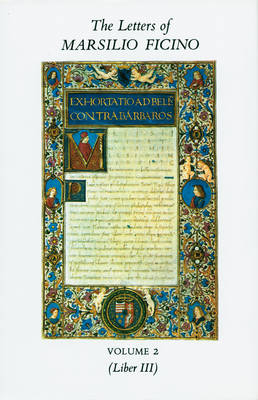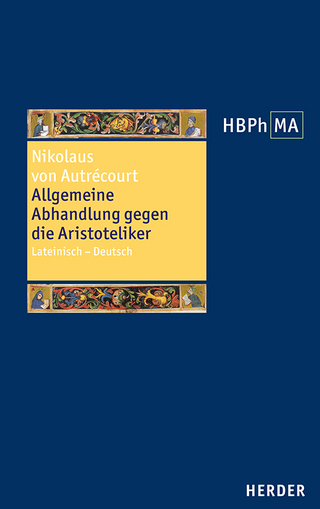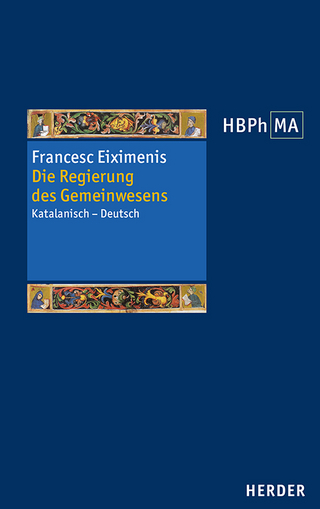
The Letters of Marsilio Ficino
Seiten
2001
Shepheard-Walwyn (Publishers) Ltd (Verlag)
978-0-85683-036-5 (ISBN)
Shepheard-Walwyn (Publishers) Ltd (Verlag)
978-0-85683-036-5 (ISBN)
The second volume of the letters of Marsilio Ficino, who was an influential figure of the Italian Renaissance. This translation comprises the third book of Ficino's letters ("Liber III"), as published during his lifetime, and dates from August 1476 to May 1477.
Chronologically, this translation comprises the third book of Ficino's letters ("Liber III"), as published during his lifetime, and dates from August 1476 to May 1477. They follow volume 1 and are therefore published as volume 2. Both book two and three of Ficino's Letters were dedicated to King Matthias of Hungary whom Ficino regarded as a model of the philosopher king referred to in Plato's "Republic". Indeed, Matthias was no ordinary king. He became one of the very few Christian leaders to defeat the Ottoman Turks decisively during the period of their empire's almost continuous growth from the early 1300s to the death of Suleiman I in 1566. King Matthias was also a devotee of philosophy, keenly interested in the practical study of Plato. Members of Ficino's Academy dwelt at this court, and an invitation to visit his court was extended to Ficino himself. Ficino's Academy was consciously modelled on the philosophical schools of antiquity. It was not merely an institute of learning. The bond between Ficino and the other members of the Academy was their mutual love, based on the love of the Self in each, a love capable of expression in all fields of human activity.
It was because such love was the basis of his School that Ficnio could write (letter 21) - "the desire of him, who strives for anything other than love, is often totally frustrated by the event. But he alone who loves nothing more than love itself, by desiring immediately attains, and in always attaining continues to desire." It is the principle of unity to which Ficnio repeatedly returns in this volume. He returns to it not just as a philosophical concept, but as an immediate perception. In his letter to Paul of Middelburg ("distinguished scientist and astronomer"), Ficino observes - "If any age can be called a golden one it is undoubtedly the one that produces minds of gold in abundance. And no one who considers the wonderful discoveries of our age will doubt that it is a golden one. For this golden age has restored to the light the liberal arts that were almost extinct: grammar, poetry, rhetoric, painting, sculpture, architecture, music and the ancient art of singing to the Orphic lyre."
Chronologically, this translation comprises the third book of Ficino's letters ("Liber III"), as published during his lifetime, and dates from August 1476 to May 1477. They follow volume 1 and are therefore published as volume 2. Both book two and three of Ficino's Letters were dedicated to King Matthias of Hungary whom Ficino regarded as a model of the philosopher king referred to in Plato's "Republic". Indeed, Matthias was no ordinary king. He became one of the very few Christian leaders to defeat the Ottoman Turks decisively during the period of their empire's almost continuous growth from the early 1300s to the death of Suleiman I in 1566. King Matthias was also a devotee of philosophy, keenly interested in the practical study of Plato. Members of Ficino's Academy dwelt at this court, and an invitation to visit his court was extended to Ficino himself. Ficino's Academy was consciously modelled on the philosophical schools of antiquity. It was not merely an institute of learning. The bond between Ficino and the other members of the Academy was their mutual love, based on the love of the Self in each, a love capable of expression in all fields of human activity.
It was because such love was the basis of his School that Ficnio could write (letter 21) - "the desire of him, who strives for anything other than love, is often totally frustrated by the event. But he alone who loves nothing more than love itself, by desiring immediately attains, and in always attaining continues to desire." It is the principle of unity to which Ficnio repeatedly returns in this volume. He returns to it not just as a philosophical concept, but as an immediate perception. In his letter to Paul of Middelburg ("distinguished scientist and astronomer"), Ficino observes - "If any age can be called a golden one it is undoubtedly the one that produces minds of gold in abundance. And no one who considers the wonderful discoveries of our age will doubt that it is a golden one. For this golden age has restored to the light the liberal arts that were almost extinct: grammar, poetry, rhetoric, painting, sculpture, architecture, music and the ancient art of singing to the Orphic lyre."
| Erscheint lt. Verlag | 1.1.2001 |
|---|---|
| Reihe/Serie | The Letters of Marsilio Ficino |
| Übersetzer | School of Economic Science Language Department |
| Zusatzinfo | illustrations, notes, bibliography, index |
| Verlagsort | London |
| Sprache | englisch |
| Maße | 150 x 230 mm |
| Themenwelt | Geisteswissenschaften ► Philosophie ► Philosophie des Mittelalters |
| ISBN-10 | 0-85683-036-4 / 0856830364 |
| ISBN-13 | 978-0-85683-036-5 / 9780856830365 |
| Zustand | Neuware |
| Haben Sie eine Frage zum Produkt? |
Mehr entdecken
aus dem Bereich
aus dem Bereich
Buch | Softcover (2024)
Reclam (Verlag)
CHF 11,90
Lateinisch - Deutsch
Buch | Hardcover (2024)
Herder (Verlag)
CHF 97,95


